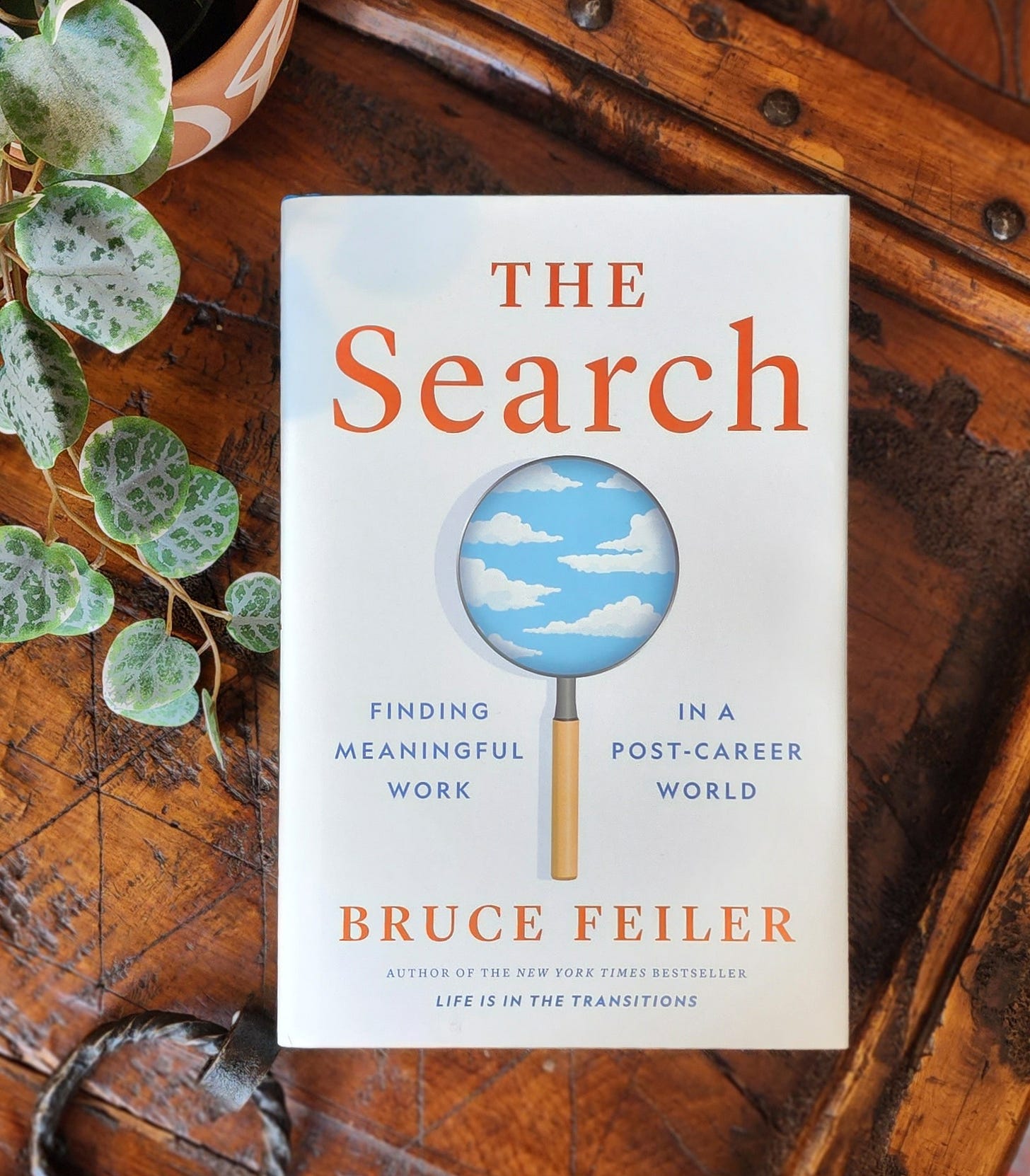How a Hollywood Sex Scandal Turned One Woman's Life Upside Down
My Favorite Story from My New Book, THE SEARCH, Out Next Week
The Search is coming out next week. I’m delighted to share another exclusive peek here.
As longtime readers of The Nonlinear Life know, six years ago this week I had an idea that changed my life. I was driving to my 30th college reunion with my friend David. He was closing a multimillion-dollar real estate deal and spent the entire car ride toggling between phone calls with ebullient lawyers on the one hand and distraught colleagues on the other. The day before, the nine-month-old baby of one of David’s partners had gone down for a nap and never woke up.
I was moderating a panel of prominent classmates that afternoon. In preparation I had assembled their résumés, all neatly typed and impressive. But I was so shaken by the story David had shared that by the time I took the stage, I looked out at the auditorium full of people, took the résumés, and ripped them in half. “I don’t care about your successes,” I said. “Tell them to your mother. I want to hear about your struggles, your challenges, what keeps you awake at night.”
That evening, the class of ’87 gathered under a massive tent. It took me two hours to walk from the bar to the barbecue as classmate after classmate came up and shared their stories:
My wife went into the hospital with a routine headache and died the next morning.
My thirteen-year-old slashed her wrists.
My mother’s an alcoholic.
My boss is a crook.
I’m afraid.
What everybody said, in one way or the other, was the same thing: The life I’m living is not the life I expected.
I’m living life out of order.
That night I called my wife. “Something’s going on. No one knows how to tell their story anymore. I’ve got to figure out how to help.”
What I did was create the Life Story Project. Over the next three years, I crisscrossed the country, collecting hundreds of life stories of people whose lives had been disrupted, upended, or rearranged in some way. These interviews became the basis of my last book, Life Is in the Transitions.
A week after it was published in July 2020, in the middle of the pandemic when the entire planet was in a life transition, I was having a drink with my editor. “Work is going to be the next domino to fall,” I said. The confluence of the public health crisis, work-from-anywhere, social upheaval, and generational change meant the old rules of work were dead but the new rules had yet to be written.
“Everybody I know is questioning what they’re doing, where they’re doing it, and why they’re doing it.,” I said.
With his blessing, I set out on another journey, collecting what became the most electrifying assortment of work stories I could have imagined. I found people in a wide array of organizations—from Fortune 500 companies to startups, multinationals to mom-and-pops—and a huge cross section of roles—from CEOs to line workers, entrepreneurs to activists. My final list included teachers, bankers, marketers, managers, nuns, novelists, firefighters, fitness instructors, truck drivers, sex workers, safecrackers, welders, brewers, doctors, farmers, comedians, mediums, nuclear physicists, and TikTok plantfluencers.
What I did with these people is something I call the Work Story Interview. What scholars call life stories—or, in this case of this project, work stories—differ in meaningful ways from typical journalistic interviews. They’re more sweeping, more structured, and more intimate. They’re also more time-consuming. Most scholarship in the field of narrative psychology includes anywhere from a handful of subjects up to a few dozen. Combined with the interviews I did for the Life Story Project, I have now collected in four years nearly 400 life stories, totaling 1,500 hundred hours, whose transcripts together run more than ten thousand pages.
The big takeaway I’ve drawn from these interviews is that fewer people are searching merely for work anymore; more people are searching for work with meaning. That idea is the foundation of my new book, The Search: Finding Meaningful Work in a Post-Carer World, which is being published on May 30th. The book offers a roadmap for finding meaning and purpose at work and includes an all-new toolkit for doing just that, “21 Questions to Find Work You Love.”
This book is being received with incredible open arms. We have a wave of thrilling media coming, including multiple appearances on television and an exclusive excerpt on the cover of the Wall Street Journal Review. You can help change your life or that of someone you love by preordering the book today. You can also help support this reader-supported newsletter.
But as a special treat for subscribers old and new, I am thrilled to include just one of the remarkable stories from The Search. In a moment in which we’re reimagining work and looking for new models of success, why not Alicia Rodis?
Alicia was the youngest of three girls of a Greek immigrant carpenter in suburban Cleveland and his much younger wife, a paralegal. “I grew up with my dad telling all sorts of stories about the Depression—sleeping in potato stacks and stealing watermelons to feed his family.”
Alicia was bullied as a child for displaying mild obsessive-compulsive behaviors. “In seventh grade I was told I had the math skills of a third grader but the communication skills of a college student.” So she gravitated to high school theater, “the island of misfit toys,” as she called it.
Turned down by Juilliard, Alicia enrolled in Wright State University in Dayton to study acting and dance. “They also had this wonderful teacher, Bruce Cromer, who taught stage combat—fist fighting, sword fighting, how to punch, slap, and kick. My oldest sister was getting a doctorate in pharmacy, and my mom said, ‘Your sisters may never love what they do. You will!’”
But could she support herself? After working on some regional productions, Alicia moved to New York, tended bar, developed a drinking problem, and stalled out. She would be yet another asterisk is an endless string of untapped success—if it weren’t for Bruce Cromer. Oh, and the fall of an infamous sex abuser.
Alicia started teaching classes in stage combat and was asked to help out on a student film. “I had read about this woman, Tonia, who did something similar for romantic scenes. She called herself an intimacy coordinator. I told the director, ‘Hey, you’ve got a sex scene coming up. I’m happy to help.”
The director agreed. “I used the same techniques we use for street fights for the bedroom. What’s the story we’re telling? What’s the emotion we’re looking for? When does the woman show her breasts? When does the man drop his pants? You have to be very clinical.”
After the film, Alicia reached out to Tonia, who was thrilled to have a compatriot. They wrote a manifesto and posted it on the internet. A few jobs trickled in, but not many.
“Then The New York Times posted its expose about Harvey Weinstein. Overnight, the deluge began.”
Alicia got a call from a producer at HBO. “God bless him, he couldn’t even say the word intimacy. It was like he was calling a prostitute.” She was invited onto the set of The Deuce. “How does this work?” the executives asked. “I have no idea,” Alicia said. “I’ve never done it for TV. But here’s what I know. Actors are no longer comfortable doing intimate scenes—not just lovemaking, but birthing, sexual assault, even kissing. Directors no longer feel comfortable asking actors to be naked because of guilt and shame. Everybody’s so worried about lawsuits they can’t perform.”
She got the job.
“The sex scenes look amazing,” the producers told her. HBO started sending her to other sets—Crashing, Watchmen. Finally, a legal team from the network flew to New York to meet her. “How do we get you on every set?”
“How many sets do you have?”
“Sixty.”
Alicia’s sister had just given her a book, Women Don’t Ask, about how to advocate for yourself, so she was feeling emboldened. “OK, that’s impossible,” she said. “But why don’t we go out on a limb together. Why don’t you hire me full time, and I’ll train a team?’”
“Can you write us a proposal?”
Alicia had no idea what to charge. With no established rate for intimacy coordinators, she had been paid at the stuntman rate—about $2,000 a week. Some friends recommended an entertainment lawyer.
“So I go to this firm, and these two attorneys start trying to daughter me. Oh, yes, what you’re doing is really important. Then they suggest I ask for a hundred thousand dollars a year. I look at them. ‘OK, wait. I work in implicit bias. I need you to pretend I’m a forty-year-old white man who is doing something that is going to revolutionize the industry. Then come back with a number.’”
The two men looked at each other. There was a long pause. Then they started laughing.
“We’ll go higher,” they said.
Alicia was hired to open a department at HBO. She was asked to write a book. The onetime Juilliard reject was invited to teach at Juilliard.
“Not long before I started doing this work, I was hired to be a background actor for Boardwalk Empire,” Alicia said. “I remember being on set one day, asking, ‘OK, when do I take my top off?’ No one said anything, so I asked again. ‘When do I take my top off?’ Everyone was just dancing around it. Finally, I just raised my hand in the middle of rehearsal. ‘WHEN DO I TAKE MY TOP OFF?’ The director said, ‘Oh, next scene.’
“When my dad came to this country from Greece,” she continued, “he made it by using his hands. He built doghouses. He joined the army. He opened a small construction company. Everything was manual, uncomfortable. That physical compulsion manifested in me. The through line in my story is I enable movement. I like to think of myself as empowering people to tell physical stories. And those stories are the most powerful of all.”
☀
Thank you for reading The Nonlinear Life. This is a reader supported newsletter. You can help by preordering my new book, The Search: Finding Meaningful Work in a Post-Career World, a new roadmap for finding meaning and purpose at work based on life stories of hundreds of Americans from all walks of life. Click on the photo below for more information and reserve your copy today.
Meanwhile, please help us grow the community by subscribing, sharing, and commenting below. If you'd like to do a storytelling project with a loved one similar to the one I did with my father, click here to learn more.
You might enjoy reading these posts:
Exclusive Sneak Peek at the Story That Inspired My New Book, THE SEARCH, Out May 30th
When Bad Things Happen To Good People
The Meaning of 18: Lines Written on the Occasion of My Daughters' 18th Birthday
Or check out my books that inspired this newsletter: Life Is in the Transitions and The Secrets of Happy Families.
Or, you can contact me directly.









I love this, Bruce!
Thank you Bruce, I have reinvented myself few times, and now I frienship with women who are willing to do the work on reinventing themselves. It is books like yours that keep me inspired, my story is not unique, but it is mine and a tool to help others. Much love!